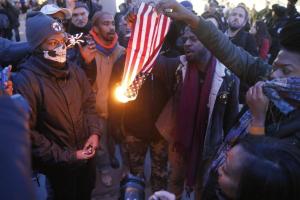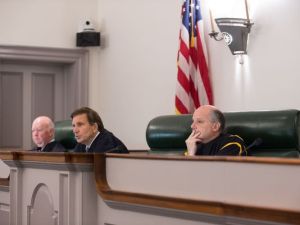Orange County Fl Bail Bondsman
Orange County Fl Bail Bond – Police can shoot dog if it barks or moves, court rules
Source : NBC 26 News
By : Mina Abgoon
Category : Orange County Fl Bail Bond , Orange County Fl Bail Bondsman

Police are permitted to shoot a dog if it moves or barks when an officer enters a home, according to a federal court ruling. The decision comes after a 2013 incident in Michigan that left two dogs dead, FOX 32 reports. Police were executing a search warrant on a home, looking for drugs, when they shot and killed two dogs.
Mark and Cheryl Brown filed a petition with the court to hold the officers of Battle Creek responsible for the deaths of two pit bulls, according to FOX 32. One officer testified that he shot the first pit bull after it moved a few inches in an alleged “lunge” towards him. The dog then ran away from the officer to the basement, where it was shot again and killed, according to court documents.
Another officer reportedly shot the second dog in the basement after it simply barked. According to the documents, the officer saw “there was blood coming out of numerous holes in the dog and…did not want to see it suffer so he put her out of her misery and fired the last shot.” In court, the Brown family apparently failed to prove that the dogs neither lunged nor barked. Judge Eric Clay wrote in the decision that — viewed from the perspective of an objectively reasonable officer — the dog posed “an imminent threat to the officer’s safety.” He further wrote,“The standard we set out today is that a police officer’s use of deadly force against a dog while executing a search warrant to search a home for illegal drug activity is reasonable under the Fourth Amendment when…the dog poses an imminent threat to the officer’s safety.”
Read more : nbc26.com/news/national/police-can-shoot-dog-if-it-barks-or-moves-court-rules
Orange County Fl Bail Bondsman – How the Law Protects Flag Burning in the United States
Source : ABC News
By : JAMES KING & GENEVA SANDS
Category : Orange County Fl Bail Bond , Orange County Fl Bail Bondsman

President-elect Donald Trump wrote on Tuesday that anyone caught burning the American flag should face consequences — including having their citizenship yanked or facing a year in jail, according to his tweet. The act is considered offensive by many, but flag burning is legal in the U.S. under Supreme Court rulings that it is constitutionally protected speech under the First Amendment. It was not clear what sparked Trump’s tweet, but it comes after a college in Massachusetts took down an American flag on campus during protests of Trump’s victory after a previous flag burning incident. Many have protested the decision by Hampshire College in Amherst, Mass.
Here’s a look at the current law and what Trump’s comments could mean:
What Is the Law?
In 1989, the high court ruled that flag burning was a form of “symbolic speech” under the Constitution. The 5-4 decision came in a case involving Gregory Joey Johnson who, outside the 1984 Republican National Convention, burned the flag to protest the policies of then-President Ronald Reagan. Johnson faced a fine and a year in prison for violating a Texas law that made burning the flag a felony. The case made its way to the Supreme Court and although divided, the justices sided with Johnson, reversing the lower court ruling. It is unclear whether any of Trump’s potential Supreme Court nominees would side with him on outlawing flag burning. Former Justice Antonin Scalia sided with the majority in the 1989 ruling that flag burning is protected as “symbolic speech.” Trump has praised Scalia and said that he would seek to appoint a similar justice to the court.
Proposed Laws
In 1990, Congress passed the Flag Protection Act to outlaw knowingly burning or otherwise defacing the American flag. The Supreme Court shot down that law as well, holding that it violated the First Amendment. There have been other attempts by Congress to legislate flag burning, but none have passed. The House went as far as approving an amendment to ban “flag desecration,” but it has never made it through the full Senate. Congress shot down the most recent proposed constitutional amendment to ban flag burning in 2006. The measure, co-sponsored by Hillary Clinton, would have outlawed flag desecration and made it punishable by a fine.
Reaction
Trump transition team spokesperson Jason Miller defended the president-elect’s tweet. “Flag burning should be illegal,” Miller said on CNN. “The president-elect is a very strong supporter of the First Amendment, but there’s a big difference between that and burning the American flag.” Some of Trump’s fellow Republicans broke with his stance on flag burning. House Majority Leader Kevin McCarthy, a Republican, stated that while he does not “support or believe in the idea of people burning the American flag, I support the First Amendment.” The American Civil Liberties Union slammed Trump’s tweet as “fundamentally un-American.” “The idea that the government could not only censor someone for engaging in political speech, but actually revoke a protester’s U.S. citizenship as a punishment for political speech is unconstitutional and fundamentally un-American,” ACLU senior staff attorney Lee Rowland said. White House Press Secretary Josh Earnest criticized Trump’s suggestion that flag burners face jail time or lose citizenship, saying that “we have a responsibility as a country” to defend the First Amendment. Senate Majority Leader Mitch McConnell also broke with Trump on his call to punish flag burners. In reference to burning the flag, McConnell said “that activity is a protected First Amendment right. A form of unpleasant speech, and in this country we have a long tradition of respecting unpleasant speech. I happen to support the Supreme Court’s decision on that matter.”
Read more : abcnews.go.com/Politics/law-protects-flag-burning-united-states/story?id=43855624
Orange County Fl Bail Bond – Connecticut Supreme Court sidesteps issue of social media account authentication
Source : FOX 61 News
By : ASSOCIATED PRESS
Category : Orange County Fl Bail Bond , Orange County Fl Bail Bondsman

The Connecticut Supreme Court has sidestepped the issue of how social media accounts should be authenticated in criminal cases in a ruling upholding a murder conviction. The court issued a 6-0 decision Monday in the appeal of Derrick Bouknight, who argued prosecutors didn’t prove a Facebook account they used as evidence was his.
Justices, instead, said evidence against Bouknight was overwhelming. They also said he didn’t prove the Facebook evidence had a substantial effect on the jury’s verdict. Bouknight is serving a 70-year prison sentence for fatally shooting William Baines in New Haven in 2010 in a dispute over a $100 debt.
Courts elsewhere have issued varying opinions on how much proof is required to show that a social media account belongs to a defendant.
Read more : fox61.com/2016/11/14/connecticut-supreme-court-sidesteps-issue-of-social-media-account-authentication/
Orange County Fl Bail Bondsman – NCAA violates anti-trust laws, Supreme Court rules
Source : Fox 2 Now News
By : Ariane de Vogue, CNN Supreme Court Reporter
Category : Orange County Fl Bail Bond , Orange County Fl Bail Bondsman

The Supreme Court let stand a lower court opinion that said that the NCAA ‘s so called “amateur rules” that required that college students not be paid — violate anti-trust laws. The opinion by the Ninth Circuit Court of Appeals said the NCAA could not limit schools from giving full scholarships including costs of attendance to students. The court ruled, however, that the schools did not have to hold deferred funds in a trust for athletes to cover up to $5,000 a year for name, image and likeness rights.
Current and former players including Ed O’Bannon challenged the NCAA, arguing in court papers that “college athletics is indisputably big business” but that some some athletes “cannot receive any payments, whatsoever, by fiat.” But lawyers for the NCAA argue that the rules are “essential” for the association’s “distinct product” that ensures that college athletics are distinguished from professional sports.
The challenges won a partial victory below when a lower court held that the NCAA could be subject to anti trust laws and could not limit schools from giving full scholarships including cost of attendance” to students. The court ruled, however, that the schools did not have to hold deferred funds in a trust for athletes to cover up to $5,000 a year. Critics of the ruling worry that while the remedy in the case at hand was relatively limited it could open the door for future cases down the road. Both sides asked the Supreme Court to review the case and the justices declined both petitions on Monday.
On Monday, Donald Remy, NCAA chief legal officer said he was “disappointed” that the court declined to step in to “clarify key issues of law affecting the NCAA and other similar organizations.” “We continue to believe, and many other appellate courts have agreed, that the NCAA membership agreements to advance college sports are not violations of the antitrust laws,” he said in a statement and added that the Court’s decision not to hear the case ” will not deter our members from continuing to provide students with academic opportunities, safeguarding their health and well-being and creating fair policies centered on the student-athlete experience.”
Read More : fox2now.com/2016/10/03/ncaa-violates-anti-trust-laws-supreme-court-rules/
Orange County Fl Bail Bond – A company may reject you for your looks that’s totally legal
Source : Market Watch News
By : Alessandra Malito
Category : Orange County Fl Bail Bond , Orange County Fl Bail Bondsman

Republican presidential nominee Donald Trump has not shied away from sharing his opinions on women’s looks — he’s had a lot of derogatory things to say about comedienne Rosie O’Donnell and most recently, former Miss Universe Alicia Machado, for instance. Now a 2009 lawsuit by former employees has recently surfaced claiming the real estate mogul wanted to fire employees at his Trump National Golf Club in Ranchos Palos Verdes, Calif. because they weren’t deemed attractive enough, according to a Los Angeles Times article published last week. As a result, managers would choose attractive young women to work when Trump was visiting, as opposed to those more experienced or skilled. Such a controversial lawsuit has raised the question: Is that even legal?
At first glance, yes. But it’s complicated. Personal appearance does not fall under the list of federal equal opportunity rights. But if an employer’s “look” is tied to race, gender or age, then passing someone over for a job on that basis can be considered illegal. “It is not always illegal, but it can be, depending on exactly what the employer is doing,” said Emily Martin, general counsel and vice president for workplace justice at the National Women’s Law Center in Washington, D.C. Under the U.S. Equal Employment Opportunity Commission, discrimination of employees or applicants includes age, disability, national origin, race, religion, sexual orientation, pregnancy and genetic information, such as family’s medical history. Only when one of these attributes is connected to a hiring committee’s perception of attractiveness would hiring based on looks come into legal territory.
The Trump Organization, which includes his real estate, hotel, entertainment and television businesses, says the allegations in the lawsuit were meritless, Jill Martin, vice president and assistant general counsel for The Trump Organization said in an email via public relations. “We do not engage in discrimination of any kind,” she wrote. “The only appearance Mr. Trump cares about is that of the facility and the grounds. Rather than looking to old statements from a handful of employees with an ax to grind, the media should focus on the thousands of happy employees, of all races, gender, size and shape, whose lives upon which Mr. Trump has made an incredibly positive impact.” Whether a company would want to be known as the place that hires based on looks and not qualifications is debatable, however. There are a few establishments that might jump to mind, and they have been called out for it.
In 2003, clothing retailer Abercrombie & Fitch ANF, -1.07% was sued for placing preference on white applicants in store hiring and promotions as well as advertisements and catalogues, resulting in the company expanding its marketing materials by adding more diversity, according to the New York Times. In 2015, 62,000 employees filed a class-action lawsuit against the company for enforcing a policy stating they must purchase and wear the company’s clothes without reimbursement of the cost of those outfits. If they did not adhere to the policy, they were allegedly sent home or lost shifts, the Huffington Post reported. That same year, the Supreme Court ruled against the clothing company, stating a woman was denied a job there for wearing a hijab. The company changed its policies completely in 2015, and their website has a page dedicated to diversity. “It’s silly because you’re going to end up with a less efficient outcome,” said Jesse Rose, an attorney with The Rose Law Group in Astoria, N.Y. “If your goal is to make the most money, why wouldn’t you hire the most qualified applicant?” Details matter when it comes to a person feeling singled out based on personal appearance, Martin said. In some cases, companies may have an explicit policy stating how their employees must look. When it comes to grooming, it should be equal between a man and a woman — forcing female employees to adhere to a certain dress or appearance code and not their male counterparts could be considered sexual discrimination. In the mid-1990s, American Airlines AAL, +2.98% disbanded its weight policies, after numerous years and lawsuits claiming women were held to a specific weight requirement, a company spokesman confirmed. “It is easier [to prove] if the employer is straightforward and clear about the standards it is applying,” Martin said.
Read More : marketwatch.com/story/a-company-may-reject-you-for-your-looks-and-thats-totally-legal-2016-10-03
Orange County Fl Bail Bondsman – Industries for the Blind faces legal challenge for VA optical contracts
Source : Journal Now
By : Richard Craver Winston-Salem Journal
Category : Orange County Fl Bail Bond , Orange County Fl Bail Bondsman

The optical lab at Winston-Salem Industries for the Blind Inc. is at the center of a legal fight over which groups should have priority in providing eyeglasses to veterans. At stake are 52 jobs with the nonprofit agency — 45 filled by employees who are blind, including 43 locally, and seven filled by veterans, including three locally. Winston-Salem Industries for the Blind is the nation’s largest employer of individuals who are blind or visually impaired. It has 457 local employees, of whom 271 are blind. The local optical lab makes eyeglasses for VA facilities in five states, as well as selling eyeglasses to the public. It was expanded in October at a $1.1 million cost. A bid protest was filed Aug. 25 by PDS Consultants Inc. against the federal government in the U.S. Court of Federal Claims. Also listed as a defendant is the independent federal agency known as the U.S. Committee for the Purchase From People Who Are Blind or Severely Disabled, also known as AbilityOne. That agency oversees the awarding of federal contracts with nonprofit agencies that train and employ people with disabilities.
PDS wants the opportunity to have priority status on AbilityOne’s three optical network contracts with the VA. It wants a permanent injunction placed on the VA to halt the awarding of future VA optical contracts until the dispute is settled. Winston-Salem Industries for the Blind said in a statement that an injunction “would essentially shut down” the optical lab operations. The agency was approved Aug. 31 as an intervenor on the side of the federal government, while National Industries for the Blind’s request was denied. An intervenor can provide counsel advice to a defendant addressing its interest in the legal case, as well as provide protected records. PDS, based in Sparta, N.J., says it is a small business owned by a disabled service veteran. It said in the complaint it has provided visual products to the VA since 1998. Winston-Salem Industries for the Blind’s optical labs have served the VA since 2000. The agency said that in the past 10 months, it has provided eyeglasses to nearly 175,000 veterans with 97 percent of the orders meeting or exceeding the delivery window. Besides the 52 jobs directly affected by the legal case, the agency said “there is additional risk to other operations and positions.” “Since (the agency) was established as a nonprofit agency in the AbilityOne program nearly 80 years ago, there has never been a more real threat to the work we do in providing employment, training and services for people who are blind or visually impaired,” said Danny Kelly, the agency’s chief operating officer.
Essence of case
At its essence, the legal case is about PDS’ motion to require the federal government to enforce PDS’ interpretation of the federal Veterans Benefits Act of 2006. The act is considered one of the ways Congress recognizes and repays disabled veterans for their military service. PDS officials claim the act gives it priority in filling VA eyeglasses orders over Winston-Salem Industries for the Blind through the federal Veterans First contracting program. Currently, the AbilityOne program is considered as a priority source for the VA. The Veterans First program included a requirement, known as “rule of two,” in which orders for visual-related products and services can be filled first by at least two small businesses owned by disabled veterans. Such a business must meet production and distribution bidding requirements “at a fair and reasonable price that offers best value to the United States.”
PDS cites a June 16 ruling by the U.S. Supreme Court that reinforced — in a legal case known as Kingdomware — the rule of two requirement as “mandatory, not discretionary.’ However, a policy memorandum issued by the VA in July does not direct VA contracting officers to give priority to veteran-owned businesses over AbilityOne products and services. Where Winston-Salem Industries for the Blind comes in is that PDS wants the federal government to review its “continued ordering” from AbilityOne for three Veterans Integrated Services networks. The committee said in an Aug. 5 final rule that a fourth network would be required to use a National Industries for the Blind source as of Sept. 4. PDS said ordering from AbilityOne violates the rule of two requirement. PDS argues “it would have a substantial chance to have received” earlier network contracts had it been allowed to bid.
Room for everyone?
Kelly said he believes “there is enough business with the VA for everyone, veteran-owned businesses as well as AbilityOne agencies like IFB, to be successful.” “Many of our employees are veterans — some having lost their sight after leaving the military, and others with service-connected disabilities. “We are, by all accounts, an exceptional service provider to the VA, and I don’t believe any organization can match our employees’ pride and patriotism.” Kelly said he believes Winston-Salem Industries for the Blind’s VA contracts are not covered by the rule of two requirement because they were added to a procurement list by the AbilityOne commission under the federal Javits-Wagner-O’Day Act of 1938. Kelly said that means its VA contracts “are considered other than competitive.” PDS argues that the Veterans Benefits Act of 2006 should hold priority over mandatory purchasing requirements in the Javits-Wagner-O’Day act. “If Congress had intended for the Javits-Wagner-O’Day act to take priority over the Veterans Benefits Act of 2006 for purposes of VA procurements, Congress could have done so,” PDS said. Kelly said AbilityOne “was specifically and purposefully created to create and protect jobs for people who are blind or severely disabled outside of this competitive environment and with the vigilant oversight of the Committee for Purchase to ensure equity and access for all.”
Read More : journalnow.com/news/local/industries-for-the-blind-faces-legal-challenge-for-va-optical/article_7121024a-23b9-5c56-8738-cbebe15cb491.html
Orange County Fl Bail Bond – Abortion law appeal clocks up £100,000 bill
Source : Irish News
By : Michael McHugh, Press Association
Category : Orange County Fl Bail Bond , Orange County Fl Bail Bondsman

The Justice Department has spent more than £100,000 defending the north’s abortion law against legal action taken by the Human Rights Commission. Lord chief justice Sir Declan Morgan and two other Court of Appeal judges are considering their judgment following a hearing last June. In November last year the High Court found that the current restrictive law is incompatible with human rights. The Department of Justice and Attorney General are appealing the finding.
The department said it had spent £102,217 on legal fees for the High Court and Court of Appeal challenges as well as court costs. It responded to a question from Green Party Assembly member Clare Bailey. She said: “I am disappointed that over £100,000 of public money has been squandered on this unnecessary court case, which was started by the previous justice minister. “The High Court has ruled that our abortion laws are not compliant with human rights legislation and it is a disgrace that, instead of making our laws compliant, the ruling was appealed.” She said 833 women from the north travelled to England last year to access healthcare that is denied to them here.
“I trust women. I will be working to ensure that women are not criminalised when accessing healthcare, including safe, legal abortions, when they need it.” The commission had repeatedly advised the DoJ that the existing law violates the human rights of women and girls. Two years ago the department published a public consultation on allowing for terminations in cases of lethal foetal abnormality. In the commission’s view the department had not committed to making the changes necessary, failing to deal with serious malformation of foetus. In November 2015, the Belfast High Court found in the commission’s favour, ruling that current law was incompatible with human rights. In June 2016 the Department of Justice and attorney general appealed the judgement.
Read more at : irishnews.com/news/northernirelandnews/2016/09/08/news/abortion-law-appeal-clocks-up-100-000-bill-687722/
Orange County Fl Bail Bondsman – State Supreme Court Strikes Down Delaware’s Death Penalty Law
Source : Huffington Post
By : Christopher Zoukis
Category : Orange County Fl Bail Bond , Orange County Fl Bail Bondsman

By a 3-2 margin, the Delaware Supreme Court has declared unconstitutional the state’s death penalty law, because it allows a presiding judge to disregard a jury’s recommendation on whether the death penalty should be imposed. The state’s high court held that violates the Sixth Amendment’s right to a jury trial. The Delaware ruling follows the U.S. Supreme Court’s most recent ruling on capital punishment, Hurst v. Florida, which in January held, by an 8-1 margin, that a similar Florida law was unconstitutional, since the Sixth Amendment requires juries, not judges, be the ultimate decision makers on a criminal defendant’s guilt and punishment. The 148-page Delaware decision, released August 1, came in a challenge to the state’s law on deliberations in capital punishment cases. The challenge was brought on behalf of Benjamin Rauf, a Temple Law School graduate accused of murdering a classmate.
Before the Supreme Court’s Hurst decision, Florida allowed executions when a separate proceeding after conviction found the death sentence justified. In that hearing, the jury provided an advisory sentence, with only a majority vote needed to recommend capital punishment, but the sentencing judge could accept or reject the jury’s advice. After Hurst’s trial, the jury recommended the death penalty by a 7-5 margin. After the Supreme Court invalidated Florida’s procedures, that state suspended executions, leaving up in the air the fate of nearly 400 Death Row inmates in the state, while the state legislature sought to revise state law to address the Supreme Court’s objections. In March, the legislature passed, and Gov. Rick Scott signed, a bill which removed a sentencing judge’s ability to overturn a jury’s recommendation on the death penalty, and raised the required vote for a jury calling for the death sentence from a simple majority to at least 10-2 in favor.
Of the 31 states allowing death sentences, Alabama was the only state besides Delaware and Florida that gave judges, rather than juries, the final decision on the death penalty. Shortly after handing down the Hurst decision, an Alabama inmate claimed that state’s death penalty deliberation procedures had the same flaw as did the Florida law. Since then, at least one Alabama judge has found the state’s law unconstitutional, and — if not resolved by state courts — the issue could make its way to the U.S. Supreme Court. Florida, despite its revamped death penalty deliberation law, could also find itself defending the new statute before the Supreme Court. The Hurst decision did not address the constitutionality of allowing a less than unanimous jury to hand down a death sentence, but opponents of capital punishment have long wanted to interest the Supreme Court in taking up that issue. In addition, two of the Supreme Court’s current eight members have written in favor of taking up the question of whether the death sentence inherently violates the Eighth Amendment’s ban on cruel and unusual punishment. And as public opinion polls show ever-dwindling majorities supporting capital punishment, for the first time ever, the Democratic Party’s national platform this year pledges to abolish capital punishment.
Read more at: huffingtonpost.com/christopher-zoukis/state-supreme-court-strik_b_11519018.html
Orange County Fl Bail Bondsman – Legal Sea Foods ad has people upset
Source : Boston Globe
By : Mark Shanahan
Category : Orange County Fl Bail Bond , Orange County Fl Bail Bondsman

Legal Sea Foods likes to create edgy ad campaigns. Remember the restaurant’s TV spot mocking save-the-animals PSAs by suggesting fish should be protected so we can eat them? Animal-rights activists were not amused.
Well, a Legal Sea Foods ad in Monday’s Boston Globe has upset people once again. On the same day the Democratic National Convention is beginning in Philadelphia, the restaurant placed a full-page ad featuring restaurant CEO Roger Berkowitz and a picture of presumptive Democratic presidential nominee Hillary Clinton. “We Have a Term for Cold Fish. Sushi,” the ad reads. “Berkowitz for President. #FeelTheBerk.”
But the hashtag for Berkowitz’s faux campaign to be commander in chief was co-opted by people on Twitter to register their outrage at the ad. “Just tried to call #legalseafoods HQ to register disgust at hateful misogyny in Globe ad today.
Read More : bostonglobe.com/lifestyle/names/2016/07/25/legal-sea-foods-has-people-upset/poEX13HVf7WZyu0Gl1UhvL/story.html
Orange County Fl Bail Bond – Supreme Court overturns abortion parental- Notification law
Source : k Too Public Media
By : Anne Hillman, Alaska Public Media
Category : Orange County Fl Bail Bond , Orange County Fl Bail Bondsman

The Alaska Supreme Court on Friday overturned the state’s parental notification law for minors seeking abortions. The 2010 voter-passed initiative required an unmarried woman under 18 who wanted to terminate her pregnancy to notify her parents 48 hours before the procedure. A woman could go to court and ask a judge for an exception, but would have to prove she was either mature enough to make the decision on their own, or that she was being abused.
The court deemed the law unconstitutional. In the opinion, Justice Daniel Winfree wrote that the notification law violates the equal protection clause of the state’s constitution. Three justices agreed with that decision, but for different reasons. They argued it violates the privacy clause. Laura Einstein is chief legal counsel for Planned Parenthood of the Great Northwest, one of the plaintiffs in the case. She said that they are gratified by the decision. The organization knows anecdotally that most underage women do involve their parents when making these decisions, she said, but there’s a smaller group of women who can’t. “The group that we were most concerned about protecting were the ones for whom notifying a parent was risky to their family situation either because it was an abusive household, it was an unsupportive household, [or] it was a place where there was substance abuse,” she said.
The only dissenting justice was Craig Stowers, who wrote that a judicial bypass was a “negligible hurdle” for young women since they would be provided with free legal counsel and could be excused from school for a hearing. But Einstein with Planned Parenthood says those measures represent is a significant barrier. “At trial we produced a lot of testimony about what an onerous, daunting, intimidating, and time consuming option that is,” she said. Einstein said even if a woman went to court and the judge excused her from school, her parents would still be notified that she was absent. Anchorage Republican Sen. Mia Costello was one of the sponsors of the ballot initiative before she was elected to public office and said she’s disappointed in the ruling. “As a parent and as an Alaskan and as an American, I think that we’re at a time right now where parental involvement and parental rights should be strengthened in our society rather than diminished.” She said it’s a wakeup call for parents to be more involved with their children’s lives. Costello said she will not pursue a similar bill in the next legislative session because she wants to focus on the state’s fiscal problems.
Read More : ktoo.org/2016/07/22/supreme-court-overturns-abortion-parental-notification-law/
- ← Previous
- 1
- 2
- 3
- …
- 8
- Next →